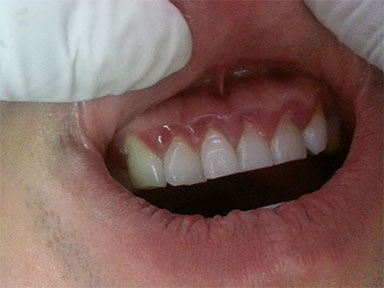
Bad breath, also known as halitosis, is breath that has an unpleasant odor. This odor can strike periodically or be persistent, depending on the cause. In many people, the millions of bacteria that live in the mouth (particularly on the back of the tongue) are the primary causes of bad breath. The mouth’s warm, moist conditions make an ideal environment for these bacteria to grow. Most bad breath is caused by something in the mouth.
Some types of bad breath, such as “morning mouth,” are considered to be fairly normal, and they usually are not health concerns. The “morning mouth” type of bad breath occurs because the saliva that regularly washes away decaying food and odors during the daytime diminishes at night while you sleep. Your mouth becomes dry, and dead cells adhere to your tongue and to the inside of your cheeks. Bacteria use these cells for food and expel compounds that have a foul odor.
In addition, bad breath can be caused by the following:
- Poor dental hygiene — Infrequent or improper brushing and flossing can leave food particles to decay inside the mouth.
- Infections in the mouth — Periodontal (gum) disease
- Respiratory tract infections — Throat infections, sinus infections, lung infections
- External agents — Garlic, onions, coffee, cigarette smoking, chewing tobacco
- Dry mouth (xerostomia) — This can be caused by salivary gland problems, medications or by “mouth breathing.”
- Systemic illnesses — Diabetes, liver disease, kidney disease, lung disease, sinus disease, reflux disease and others
- Psychiatric illness — Some people may perceive that they have bad breath, but it is not noticed by oral-health-care professionals or others. This is referred to as “pseudohalitosis.”
Symptoms
A person may not always know that he or she has bad breath. This phenomenon is because odor-detecting cells in the nose eventually become accustomed to the constant flow of bad smells from the mouth. Others may notice and react by recoiling as you speak.
Other associated symptoms depend on the underlying cause of bad breath:
- Poor dental hygiene — Teeth are coated with film or plaque, food debris trapped between teeth, pale or swollen gums
- Infections in the mouth — Gums may be red, swollen and bleed easily, especially after brushing or flossing; pus may drain from between teeth; a pocket of pus (abscess) at the base of a tooth; loose teeth or a change in “fit” of a denture; painful, open sores on the tongue or gums
- Respiratory tract infections — Sore throat, swollen lymph nodes (“swollen glands”) in the neck, fever, stuffy nose, a greenish or yellowish nasal discharge, a mucus-producing cough
- External agents — Cigarette stains on fingers and teeth, a uniform yellow “coffee stain” on teeth
- Dry mouth — Difficulty swallowing dry foods, difficulty speaking for a prolonged period because of mouth dryness, a burning sensation in the mouth, an unusually high number of dental caries, dry eyes (in Sjögren’s syndrome)
- Systemic (bodywide) illnesses — Symptoms of diabetes, lung disease, kidney failure or liver disease
Diagnosis
A dentist or physician may notice the patient’s bad breath while the patient is discussing his or her medical history and symptoms. In some cases, depending on the smell of the patient’s breath, the dentist or physician may suspect a likely cause for the problem. For example, “fruity” breath may be a sign of uncontrolled diabetes. A urine-like smell, especially in a person who is at high risk of kidney disease, can sometimes indicate kidney failure.
Your dentist will review your medical history for medical conditions that can cause bad breath and for medications that can cause dry mouth. Your dentist also will ask you about your diet, personal habits (smoking, chewing tobacco) and any symptoms, including when the bad breath was noticed and by whom.
Your dentist will examine your teeth, gums, oral tissues and salivary glands. He or she also will feel your head and neck and will evaluate your breath when you exhale from your nose and from your mouth. Once the physical examination is finished, your dentist may refer you to your family physician if systemic problems are the most likely cause. In severe cases of gum disease, your dentist may recommend that you be seen by a periodontist (dentist who specializes in gum problems).
Expected Duration
How long bad breath lasts depends on its cause. For example, when the problem results from poor dental hygiene, proper dental care will begin to freshen the mouth immediately, with even more impressive results after a few days of regular brushing and flossing. Periodontal disease and tooth abscess also respond quickly to proper dental treatment. Bad breath resulting from chronic sinusitis may be a recurring problem, especially if it is caused by a structural abnormality of the sinuses.

Bad breath the results from a systemic illness may be a long-term problem that can often be controlled with proper medical care.
Prevention
Bad breath caused by dental problems can be prevented easily. Daily maintenance calls for brushing your teeth, tongue and gums after meals, flossing, and rinsing with mouthwashes approved by the American Dental Association (ADA). Regular visits to the dentist (at least twice a year) should be made for dental examinations and for professional teeth and gum cleaning.
Bad breath also can be combated by drinking plenty of water every day to encourage saliva production. An occasional swish of the mouth with water can loosen food particles. Other products that keep breath fresh and prevent plaque from forming include sugar-free gum, sugarless lozenges, raw carrots and celery
Treatment
The treatment of bad breath depends on its cause.
When To Call A Professional
Call your dentist promptly if you have bad breath with swollen gums that bleed easily or loose teeth. Also, call your doctor if you have bad breath along with a fever, sore throat, a postnasal drip, a discolored nasal discharge or a mucus-producing cough. Even if you have none of these associated symptoms, call your dentist or physician if your bad breath continues despite a good diet and proper dental hygiene.
If you have diabetes, gastroesophageal reflux disease (GERD) or chronic liver or kidney disease, ask your doctor how bad breath can be a sign that your underlying medical condition needs immediate medical attention.
Prognosis
Once bad breath has been diagnosed, the outlook for fresh breath is usually excellent as long as you stick to your dentist’s or physician’s treatment plan.
By: Ladan Zinati

georgetown dentist
July 24, 2013I might become a regular here..
admin
July 28, 2013You are always welcome!
dentist georgetown
July 24, 2013Great site, thanks for the info. Much appreciated. C
admin
July 28, 2013You are welcome.
Cornelius Laurie
July 24, 2013I am so glad I stumbled upon your site. I really found you by mistake, while I was browsing on Bing for something else. Anyways I am here now and would just like to say thank you for a great post and an all round enjoyable blog. (I also enjoy the theme/design), I don’t have time to read through it all at the moment, but I have added your website to my favorites, so when I have time I will be back to read more. Please do keep up the awesome job!
admin
July 28, 2013Welcome to my blog and thanks for bookmarking it.
Rachaels Take on Using Coupons
July 24, 2013Your style is unique compared to other folks I have read stuff from. Many thanks for posting when you’ve got the opportunity, Guess I will just bookmark this blog.
admin
July 28, 2013Thank you Rachael.
anabolic cooking recipes
August 2, 2013I found your blog website on google and examine a few of your early topic: What Causes My Bad Breath? St. James Dental Group. Continue to keep up the very good operate. I just further up your RSS feed to my MSN Information Reader. Seeking ahead to reading extra from you later on!
admin
August 7, 2013Thanks for visiting my blog and thanks for subscribing to my rss feed.
Nicole
August 12, 2013Interesting blog and post here! Great information and good work, well done!
admin
August 18, 2013Thank you Nicole. Aprreciate your comment, come back any time.
Printable Grocery Coupons
August 19, 2013Good post. I learn something new and challenging on websites I stumbleupon every day. It’s always helpful to read articles from other authors and practice something from other sites.